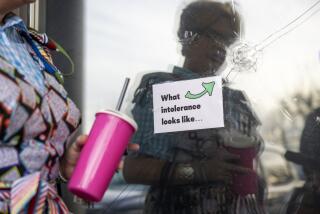Nairobi blast survivors say they’ve been abandoned
They call themselves the forgotten victims of Al Qaeda’s deadliest terrorist strike against U.S. interests abroad.
Survivors of the Aug. 7, 1998, U.S. Embassy bombing in Nairobi will gather today at the blast site for a 10th anniversary memorial service to honor the 218 people killed and 5,000 injured. Twelve Americans were among the dead.
But amid the sorrow and prayers, victims also plan to voice their anger -- not just at the terrorists but at the U.S. and Kenyan governments, which they accuse of abandoning them.
While many of the Sept. 11 victims in the U.S. have received between $1 million and $2 million in payouts, Kenyan victims of the 1998 attack, and those who suffered after a simultaneous strike against the U.S. Embassy in Tanzania, complain that their compensation, which ranged between $400 and $9,000, was sorely inadequate.
“We are struggling to cope with life, but nobody wants to be bothered with us anymore,” said Paul Wala, chairman of a victims advocacy group.
He said some of the injured use wheelchairs and that many are blind. A large number have been unable to return to work, forcing their families into poverty amid ongoing medical and rehabilitation bills. Most struggle with chronic aliments, including back pain, fatigue and depression.
Victims are also outraged by what they perceive as a lack of respect from the U.S. and Kenyan governments.
For 10 years, victims have had to organize and fund their own annual memorial services. The Kenyan government hasn’t sent an official representative since 1999, though this year Prime Minister Raila Odinga is expected to speak. Wala’s group is scrambling for private donations because many victims can’t afford the bus fare to attend the downtown ceremony.
U.S. officials, meanwhile, are hosting a private memorial service across town. Wala bristled at the dueling services.
“On the 10th anniversary, more than ever, we should all be together,” he said. “But U.S. officials fear coming to our service because they will be embarrassed or asked about the compensation.”
His group is seeking $1 million per victim, insisting that the U.S. bears responsibility. “If it weren’t for the U.S. Embassy in Kenya, we would not have been bombed.”
U.S. Ambassador Michael E. Ranneberger expressed sympathy for the victims’ plight, but disputed claims that they have not received American support.
“I don’t think they have fallen through the cracks,” he said. “The U.S. was tremendously responsive at the time of the bombing. They’ve received support, though it may not be as much as they feel they deserve.”
The U.S. government says that over the last decade it has spent $42 million in assistance, including paying victims’ medical bills for three years, offering scholarships, repairing buildings and funding disaster- preparedness programs. The U.S. continues to provide help, but as with all previous aid, none of the funds go directly to survivors as compensation.
“We simply don’t, as a matter of policy, provide compensation,” Ranneberger said. “This is not something we’ve done anywhere in the world.”
Among other things, U.S. officials worry about setting a costly legal precedent for other terrorist strikes.
The only direct compensation for victims came from a Kenyan government-run fund, mostly from private donations. Survivors received between $400 and $1,500, depending on the extent of their injuries. Families of the dead were given up to $9,000.
Victims say that money ran out years ago and charge that some aid money was lost to corruption.
Agnes Wambua, 51, was on the fourth floor of an office tower next to the embassy when the truck bomb caused her building to collapse. She spent 18 months in the hospital, unable to walk because of extensive back and leg injuries.
Her initial medical bills were covered by the U.S., and she received about $1,300 from the Kenyan fund. But she said the money barely paid for the first year of weekly taxi bills to transport her to the hospital for rehabilitation.
Today the former secretary can walk, but she spends more than $100 a month on medications, doctors and therapy.
The family of Rose Wanjiku Mwangi, a tea lady whose struggle to survive riveted the nation, says financial hardships made it difficult to keep her three orphaned children together. Trapped for three days amid rubble and crying out for help, Mwangi became an international symbol of hope, dubbed Kenya’s “candle in the wind.” When rescuers arrived too late to save her, the country mourned.
“In the beginning there was a lot of support, but we got nothing financially from the government, and it’s been very hard,” said Lucy Mwangi, a sister who cares for Rose’s youngest daughter.
Victims also blamed the Kenyan government for neglecting their needs.
“We are treated like a nuisance, like beggars,” said Flora Wamukowa, an office worker whose baby was born prematurely because of her injuries.
Kenyan officials say they cannot afford to help victims, insisting that the U.S. should shoulder the responsibility.
“The only victims gripe against us is that we haven’t done enough to pressure the U.S. to give Kenyans what they’ve given Americans,” said Alfred Mutua, spokesman for the Kenyan government, calling the U.S. policy “a double standard.”
Local resentment grew worse when Congress expanded the multibillion-dollar Sept. 11 fund to retroactively include a few dozen American victims of the 1998 embassy bombings, but not their Kenyan counterparts.
“Why?” asked Wambua. “Is that because we are African? Are we not worth as much?”
--
More to Read
Start your day right
Sign up for Essential California for news, features and recommendations from the L.A. Times and beyond in your inbox six days a week.
You may occasionally receive promotional content from the Los Angeles Times.






